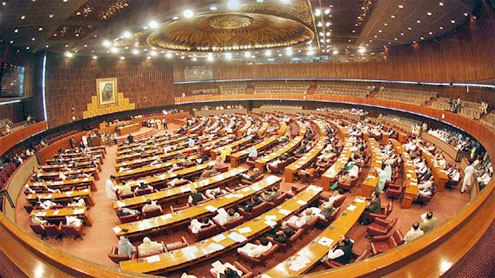 ISLAMABAD – A noisy session of the National assembly is expected today as the coalition government will forcefully push for the passage of its resolution in support of the “political leadership”, strengthening of democracy and supremacy of parliament, asking other state organs to adhere to the principle of trichotomy, with the PML-N-led opposition likely to reject it in case the proposed amendments to the draft are not included.
ISLAMABAD – A noisy session of the National assembly is expected today as the coalition government will forcefully push for the passage of its resolution in support of the “political leadership”, strengthening of democracy and supremacy of parliament, asking other state organs to adhere to the principle of trichotomy, with the PML-N-led opposition likely to reject it in case the proposed amendments to the draft are not included.
The resolution of “trust” in the political leadership was tabled in the National Assembly on Friday following a clear warning from the army that there could be “grievous consequences” of the recent criticism by Prime Minister Yousaf Raza Gilani of the army leadership in his interview to a Chinese news agency. Gilani had dubbed the replies to the Supreme Court by Chief of Army Staff (COAS) General Ashfaq Kayani and Inter-Services Intelligence (ISI) Director General Lt General Ahmad Shuja Pasha “illegal”.
In his address to the National Assembly on the occasion of tabling of the resolution by government’s ally and ANP leader Asfandyar Wali Khan, Gilani had said that it was time to decide whether the country wanted democracy or dictatorship He said: “Our resolution is not at all against any institution, it is not against the judiciary, it is not against the army. Our resolution is for the strengthening of democracy.”
The National Assembly session was summoned in the wake of important development in the Supreme Court in the NRO implementation case when Justice Asif Saeed Khosa-led bench observed prima facie that Prime Minister Gilani was not an “honest” person and not “ameen” and spelt out six options for the implementation of the judgment on the National Reconciliation Ordinance (NRO).
It was in that environment that President Asif Ali Zardari and Prime Minister Gilani wanted the National Assembly to be in session to show their political strength with the government’s allies standing firmly behind them. At the very outset, however, the ruling party’s attempts were frustrated by it allies, the Pakistan Muslim League-Q (PML-Q) and the Muttahida Qaumi Movement (MQM), which warned the government to stay away from any confrontation with the army and the judiciary.
The allied parties and ANP reportedly toned down the language of the resolution to make it largely acceptable even to the major opposition party, the PML-N, by taking out specific reference to the president and the prime minister and reposing confidence in them. The PML-N, nonetheless, proposed some amendments to the resolution moved by the PPP-led coalition government.
Through amendments signed by all 90 members of the PML-N, the opposition seeks to remove the call for all state institutions to “strictly function” within the constitutional limits and instead suggested to make it binding on the government “to immediately implement in letter and spirit all previous resolutions of parliament and all the decisions of the superior judiciary”.
The PML-N draft also calls upon the government to ensure that all administrative actions are strictly in accordance with the constitution and the law for smooth functioning of all state institutions. The resolution is likely to be approved owing to the allied parties’ decision to support it, but not unanimously, because of the PML-N’s opposition and rather tough conditional support, which seems unacceptable to the government.
PML-Q President Chaudhry Shujaat Hussain has already announced to support the resolution whereas ANP’s position is also very much clear with its leader Asfandyar Wali tabling the draft in the House.Another main ally of the government, the MQM, held two-day consultations on Saturday and Sunday on whether to support the government’s resolution or not. On Sunday, the MQM also announced that it would support the government.
The fact that the MQM took two days to reach any decision on its support to the resolution and Interior Minister Rehman Malik playing his role once again to win over the ally by reaching Karachi, is also a disturbing sign for the ruling party, which had expected initially to have the unanimous approval of the resolution. The observers say that despite the approval of the resolution, the problems of the government are not bound to lessen, especially given the serious situation that it is facing in the Supreme Court over the NRO and the “memogate” scandal. – PT












